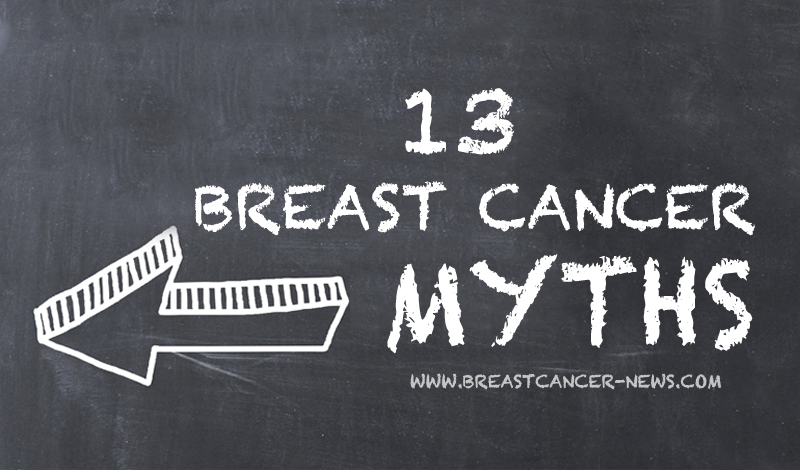Breast cancer refers to the formation of malignant tumors (mass of cells dividing in an uncontrolled manner, having impaired DNA functions and fatal consequences) in the breast tissue. The most common form of breast cancer is ductal carcinoma (DC), which starts at the lining of the milk ducts and spreads consequently to these ducts which carry milk to the nipples after childbirth.
Although breast cancer is one of the most common cancers, there are still lots of things we don’t know about it. A lot of misinformation is spread about it, so we decided to put together a list of 13 breast cancer myths which are actually false. Find more about them here (source: Breast Cancer Deadline 2020 website):
1. Monthly breast self-exams save lives: This is a false statement. Actually, the evidence shows that breast self-exam (BSE) does not save lives or detect breast cancer at an earlier stage.
2. Mammograms can only help and not harm you: Not true. The biggest risk on mammograms are the false positive results that may lead to unnecessary, intrusive surgical interventions while false negative results will not find cancerous tumors.
3. MRI is better than mammography because it finds more cancer: MRI is a more sensitive test but it also leads to significantly more false positive results.
4. Mammograms prevent breast cancer: Mammography is a screening test to detect cancer already present in the breast. It does not prevent cancer, nor will it definitively detect the disease.
5. Most women with breast cancer have a family history of the disease: More than 75% of women with breast cancer have no family history of the disease and less than 10% have a known gene mutation that increases risk.
6. Men don’t get breast cancer: It is estimated that in 2010, 1,970 cases of breast cancer were diagnosed in men.
7. Everyone’s breast cancer is the same: There are many sub-types of breast cancer and they require different types of treatment.
Different women have different breast cancer types with unique disease characteristics including:
- the stage
- the size and grade of the tumor
- if there is lymph node involvement [nodal status]
- hormone receptor positive or negative
- Her2/neu positive or negative
8. Everyone who has a positive BRCA 1 or BRCA 2 test result will get breast cancer: While women with a positive BRCA test have a much higher chance of breast cancer, it does not guarantee the development of the disease.
9. In terms of survival, removing the entire breast is better than just cutting the cancer out and getting radiation: Completely removing the breast—known as mastectomy—is usually not more effective than just removing the tumor – known as lumpectomy. There are issues with both treatments, and patients need to be informed to make the right decision for them.
10. There are drugs that can prevent breast cancer: For women who have a high risk of breast cancer, there are drugs that may help reduce their risk but they have significant side effects. There are no drugs, however, that will definitively prevent breast cancer.
11. Once diagnosed with breast cancer, it’s very important to make treatment decisions immediately: It is normal to feel a treatment decision must be made right away, but taking the time to decide on an appropriate course of action may be time very well spent.
12. Second opinions are only for treatment options. Once I know I have breast cancer, I can get a second opinion on how to treat the disease: While you definitely should get a second opinion on how to treat your breast cancer, that is not enough. Know that all breast cancers are not the same and cannot be treated as such. Breast cancer is a complex disease with many variants needing different treatments.
13. Breast cancer survivors are too close to the issue to participate in how research money is spent: Breast cancer survivors who have been trained and educated have both the first-hand patient knowledge, as well as the ability to advocate on behalf of others, that is an important check and balance in determining research funding.
Learn more about breast cancer: http://bit.ly/learnBreastCancer
To read full and original article, and learn more about myths and facts about breast cancer: http://bit.ly/1TP9NpQ
Breast Cancer News is strictly a news and information website about the disease. It does not provide medical advice, diagnosis or treatment. This content is not intended to be a substitute for professional medical advice, diagnosis, or treatment. Always seek the advice of your physician or other qualified health provider with any questions you may have regarding a medical condition. Never disregard professional medical advice or delay in seeking it because of something you have read on this website.

